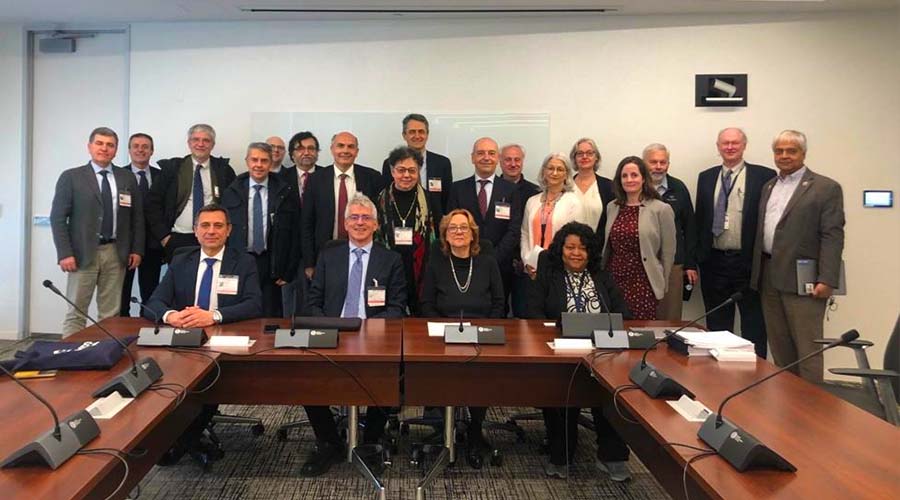 On March 9th and 10th, a series of bilateral meetings between Italy and the United States were held in Washington. The discussions focused on fundamental physics research topics, perspectives, and projects, that see the two countries engaged in a joint effort through important scientific collaborations. The protagonists of this annual event were Italian delegation, led by the INFN President Antonio Zoccoli, the INFN executive board, the Director of Gran Sasso National Laboratories Ezio Previtali, the DUNE spokesperson Sergio Bertolucci, the INFN coordinator of quantum technologis Valter Bonvicini, and the scientific attaché of the Italian Embassy in Washington, Maurizio Biasini, and US delegations composed by the major institutions responsible for funding, promoting, and conducting scientific research: the Department of Energy (DOE), the National Science Foundation (NSF), the Fermi National Accelerator Laboratory (Fermilab), and the Brookhaven National Laboratory (BNL). The two-day meetings were hosted at the headquarters of the NSF and at the Italian Embassy in Washington, respectively, providing an opportunity to strengthen and renew the long-standing cooperation between Italian and American physicists, and to review joint initiatives.
On March 9th and 10th, a series of bilateral meetings between Italy and the United States were held in Washington. The discussions focused on fundamental physics research topics, perspectives, and projects, that see the two countries engaged in a joint effort through important scientific collaborations. The protagonists of this annual event were Italian delegation, led by the INFN President Antonio Zoccoli, the INFN executive board, the Director of Gran Sasso National Laboratories Ezio Previtali, the DUNE spokesperson Sergio Bertolucci, the INFN coordinator of quantum technologis Valter Bonvicini, and the scientific attaché of the Italian Embassy in Washington, Maurizio Biasini, and US delegations composed by the major institutions responsible for funding, promoting, and conducting scientific research: the Department of Energy (DOE), the National Science Foundation (NSF), the Fermi National Accelerator Laboratory (Fermilab), and the Brookhaven National Laboratory (BNL). The two-day meetings were hosted at the headquarters of the NSF and at the Italian Embassy in Washington, respectively, providing an opportunity to strengthen and renew the long-standing cooperation between Italian and American physicists, and to review joint initiatives.
"The meetings with INFN management in Washington confirm the role of Italy as a privileged partner of the United States in the most advanced areas of physics and emerging technologies," said Ambassador Mariangela Zappia, adding that "our recognized leadership makes Italy particularly authoritative in its bid to realize the Einstein Telescope project in Italy." "Scientific and technological collaboration between trusted partners such as Italy and the United States, who share values and a vision of the future, plays an even more significant role in the current geopolitical scenario," she concluded.
Many topical issues for the physics community have been discussed in the bilateral meetings, starting with those concerning the present and future of gravitational wave studies. Italy and the United States, undisputed pioneers in the field, have laid the foundation for the largest international collaboration that involves gravitational observatories worldwide, thanks to the relationships that have always linked the Virgo and LIGO research groups. For the coming years, the collaboration will focus on new-generation terrestrial and space-based detectors, such as the Einstein Telescope, Cosmic Explorer, and LISA. Significant attention has also been devoted to scientific programs aimed at neutrino research, from the DUNE project in the United States, of which INFN is a partner, to future experiments for measuring neutrinoless double beta decay, which INFN is a candidate to host in its Gran Sasso National Laboratories.
An important discussion has also been focused on the initiatives and activities related to research in accelerator and particle physics, of which INFN is a historical partner and continues to provide fundamental contributions. Specifically, the debate has been focused on the state of ongoing cooperation activities at CERN and the mutual benefits that could derive from future collaborations within the Future Circular Collider (FCC) project and the use of superconductive technologies developed by INFN for the Eupraxia program. Last but not least, the very topical issue of quantum technology development has also been addressed, particularly the Fermilab SQMS Center's project for the realization of the future quantum computer, of which INFN is the only non-US partner.
"Besides describing an extremely rich and fruitful framework of the scientific relationships that link the United States and Italy in fundamental physics research," said Antonio Zoccoli, President of INFN, "the breadth of themes and the number of projects we discussed in Washington represents further evidence of the technical and scientific expertise that our country possesses and for which it is considered a valuable partner. The INFN community is proud to contribute thanks to its experience to many of the main scientific projects in the United States. Similarly, for INFN, it is essential to be able to count on the high-level competencies of the American counterparts for its projects."






